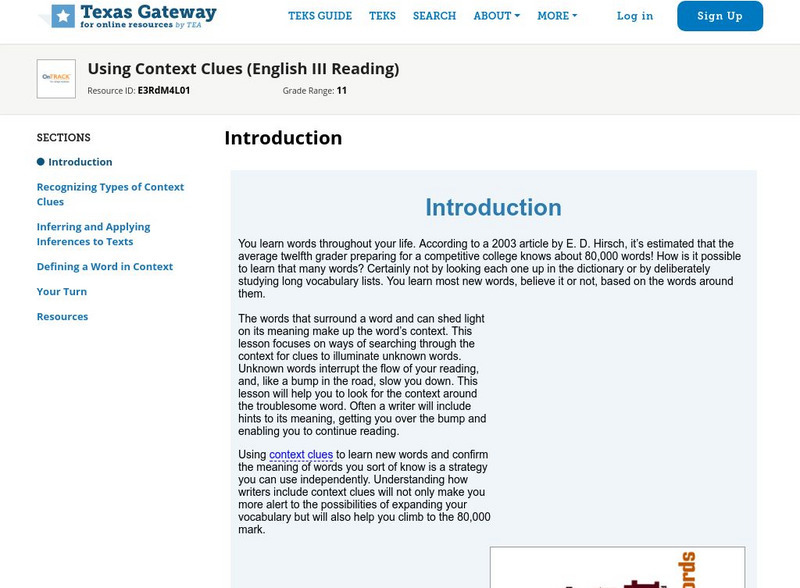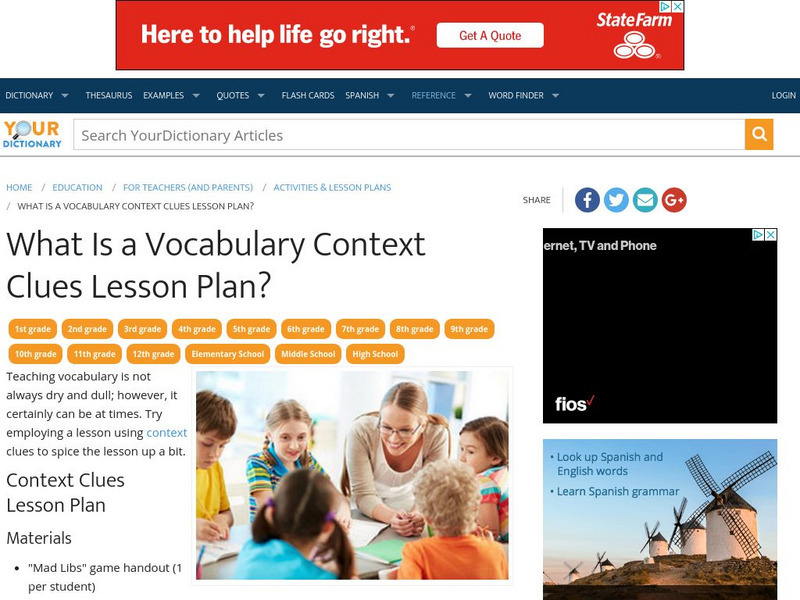Hi, what do you want to do?
Curated OER
What Does It Mean?
Learners demonstrate an understanding of words with multiple meanings. They give the meaning for each "trunk" in the sentence.
Curated OER
Reading Comprehension
First graders listen and read along as a story is read to them. They discuss what they read when finished with the text. Students discuss the story vocabulary and the word meanings. They practice decoding unknown words and complete a...
Curated OER
Using Pictures to Promote Conversation
Students initiate and sustain a conversation of three or more exchanges on a topic while exploring a collection of large photographs pertaining to that topic. The teacher creates a comfortable setting and provide a variety of books...
Curated OER
Division Cookies
Fifth graders demonstrate the concept of division through sharing concrete objects. They divide cookies into parts and recreate a whole by sharing their pieces with the group. Students request cookies during a small group actvity using I...
Curated OER
When Youth Protest: Student Activism and the Mississippi Civil Rights Movement, 1955-1970
Students explain the meaning of the following terms associated with the modern Civil Rights movement: segregation; integration; civil rights; civil disobedience.
Curated OER
ESOL Government and Community Resources
Students view pictures of government official and identify each by name and
title. They compare these U. S. officials with those in the students' native
countries then write a sentence about each of the officials.
Curated OER
The Perfect Man: Benjamin Franklin's Autobiography
Eleventh graders study the characteristics of an autobiography. They read from the autobiography of Benjamin Franklin and discuss and write an essay regarding some of his quotes.
Curated OER
Stone Tool Scavenger Hunt
Students use the internet to research the various types of stone tools used by natives. Using this information, they create a chart describing each tool and its usage. In groups, they share their charts with others and answer...
Curated OER
Whoo Knew There Were Owls
Students research information on owls using the Internet and Kidspiration. They work in groups to create a poster which includes habitat, diet and life cycle and present to the class.
Curated OER
Currency Exchange and the Gang of Fifteen
Students demonstrate the ability to comprehend and calculate currency exchange rates.
Curated OER
Making a Case for Beginning Wigh Suprasegmental Features in Pronunciation
Students explore the ways in which voice quality and intonation can convey meaning.
Curated OER
Vocabulary Tables
Students view a sample vocabulary table based on words related classical music. After students have had a chance to view the table, they break up into groups and create their own vocabulary tables based on a certain subject.
Curated OER
Gearing up for Grammar
Young scholars input autobiographical information to apply in a Diamante' poem that utilizes the different parts of speech. Students interact with each other sharing their autobiographical information completed on the database created....
Curated OER
YANG AND THE YOUNGEST AND HIS TERRIBLE EAR
Students perform a web scavenger hunt to find information about the author of the book, YANG THE YOUNGEST AND HIS TERRIBLE EAR. They develop an understanding of how writers use personal experience to add voice to their writing.
Curated OER
Correlative Conjunctions
Students identify correlative conjunctions in sentences and then rewrite pairs of sentences as a single sentence with correlative conjunctions. They practice diagramming sentences of various sentence patterns and then write a personal...
Curated OER
I Know Why the Caged Bird Sings
Students complete vocabulary activities for Maya Angelou's I Know Why the Caged Bird Sings. Students review a list of vocabulary words from the text and rate the words. Students write each word and a definition. Students discuss the...
Curated OER
The Study of the Spanish-Speaking People of Texas: Understanding Primary Sources
Students analyze Russell Lee's photo essay as a sign of segregation in Texas. They consider the differences between primary and secondary sources and how historians use these sources.
Curated OER
I'm 93, But Quitting Job Would Drive Me Off My Trolley
Learners read and discuss a news article about the elderly in the workplace. They use the content of the article for practice in making predictions, determining verb tense, and basic comprehension.
Curated OER
Mystery Box
Fourth graders engage in a icebreaker activity that is meant to introduce curriculum areas at the beginning of the school year. The teacher prepares several different boxes filled with items that are to be studied during the year. Then...
Curated OER
Easter Egg Eggstravaganza
Students identify functions and proper use of the computer. They identify secondary colors by mixing primary colors. Students reinforce listening, speaking and following directions by playing a game. They identify the color gold.
Curated OER
Vowels, Reading Fluency
Third graders practice identifying words with the short o vowel sound. They use the strategy will reading a page from The Hare and the Tortoise. They read the passage while focusing on increasing their reading fluency and practice...
Curated OER
Power and Portraiture
Ninth graders compare and contrast the art works of Van Eyck and Daumier. They examine pictures of upper and middle class people and identify the artifacts/environments particular to each group.
Texas Education Agency
Texas Gateway: Using Context Clues (English Iii Reading)
[Accessible by TX Educators. Free Registration/Login Required] This lesson focuses on ways of searching through the context for clues to illuminate unknown words. Unknown words interrupt the flow of your reading, and, like a bump in the...
Love To Know Media
Your Dictionary: What Is a Vocabulary Context Clues Lesson Plan?
This lesson plan uses Mad Libs to teach vocabulary using context clues to define unknown words.




























